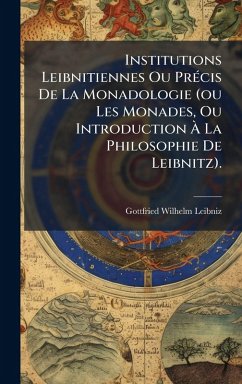Institutions Leibnitiennes Ou Précis De La Monadologie offers a detailed exploration of Gottfried Wilhelm Leibniz's monadology, one of the most significant contributions to metaphysics. This work elucidates Leibniz's concept of monads-simple, indivisible, and immaterial units that constitute the fundamental reality. Readers are guided through the intricacies of Leibniz's philosophical system, gaining insights into his views on perception, apperception, and the pre-established harmony. This book provides a critical introduction to understanding Leibniz's place in the history of philosophy, making it an essential resource for scholars and students interested in 17th-century thought and the development of modern philosophy. Delve into the essence of Leibniz's philosophy and discover the enduring relevance of his ideas. This work has been selected by scholars as being culturally important, and is part of the knowledge base of civilization as we know it. This work was reproduced from the original artifact, and remains as true to the original work as possible. Therefore, you will see the original copyright references, library stamps (as most of these works have been housed in our most important libraries around the world), and other notations in the work. This work is in the public domain in the United States of America, and possibly other nations. Within the United States, you may freely copy and distribute this work, as no entity (individual or corporate) has a copyright on the body of the work. As a reproduction of a historical artifact, this work may contain missing or blurred pages, poor pictures, errant marks, etc. Scholars believe, and we concur, that this work is important enough to be preserved, reproduced, and made generally available to the public. We appreciate your support of the preservation process, and thank you for being an important part of keeping this knowledge alive and relevant.
Bitte wählen Sie Ihr Anliegen aus.
Rechnungen
Retourenschein anfordern
Bestellstatus
Storno








![L'esprit De Fontenelle, Ou Recueil De PensÃ(c)es TirÃ(c)es De Ses Ouvrages [By A.P. Le Guay De PrÃ(c)montval]. L'esprit De Fontenelle, Ou Recueil De PensÃ(c)es TirÃ(c)es De Ses Ouvrages [By A.P. Le Guay De PrÃ(c)montval].](https://bilder.buecher.de/produkte/75/75087/75087926m.jpg)